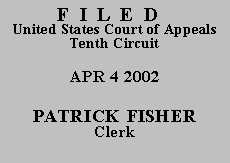

| VEAR L. BROOKS, |
|
| v. | |
| STATE OF UTAH, UTAH BOARD OF PARDONS, and JIM SMITH, Warden, |
Vear Brooks, a state prisoner proceeding pro se, requests a certificate of appealability ("COA") to appeal the denial of his 28 U.S.C. § 2254 habeas corpus petition. The record appears to indicate that Mr. Brooks was convicted in Utah state court of two counts of attempted sexual abuse of a child. According to Mr. Brooks's habeas petition, the state district court entered its judgment of conviction against him on October 21, 1994. Mr. Brooks avers that he did not directly appeal his conviction, but it appears that he filed state postconviction petitions in 1995, 1999, and 2000.
Because Mr. Brooks's conviction appears to have become final before Congress passed the Antiterrorism and Effective Death Penalty Act of 1996 ("AEDPA"), he had to file his federal habeas petition within one year of April 24, 1996 for that petition to be timely. See 28 U.S.C. § 2244(d); Gibson v. Klinger, 232 F.3d 799, 803, 808 (10th Cir. 2000). In order to determine whether Mr. Brooks's § 2254 petition was filed within the one-year time period, the district court ordered Mr. Brooks to submit a letter specifying (1) when he filed his state court post-conviction petition(s) and (2) how and when the state district court, the Utah Court of Appeals, and/or the Utah Supreme Court ruled upon those state court post-conviction petition(s). The district court advised Mr. Brooks that failure to supply such information within thirty days would result in dismissal of Mr. Brooks's petition. Mr. Brooks did not submit any information and the district court subsequently dismissed his petition.
While a district court can grant a COA, the district court did not do so in this case. Since the district court did not address the issue, a COA is deemed denied. See Tenth Circuit Emergency General Order of Oct. 1, 1996. Thus, this Court must grant a COA in order to address the merits of Mr. Brooks's claims.
To be entitled to a COA, Mr. Brooks must make a "substantial showing of the denial of a constitutional right." 28 U.S.C. § 2253(c)(2). He may make this showing by demonstrating that the issues he raises are debatable among jurists, that a court could resolve the issues differently, or that the questions presented deserve further proceedings. See Slack v. McDaniel, 529 U.S. 473, 483-84 (2000). Because he is proceeding pro se, we construe Mr. Brooks's allegations liberally. See Haines v. Kerner, 404 U.S. 519, 520-21 (1972) (per curiam).
We note that Mr. Brooks's petition in part challenges his sentence as "indeterminate" in violation of his right to due process and his right to be free from cruel and unusual punishment. See Rec. doc. 3, at 5-6 (§ 2254 Petition, filed June 22, 2001). He also appears to be challenging the execution of his sentence as unlawful, which might properly state a claim under § 2241 of AEDPA. Irrespective of whether his original petition was actually filed pursuant to § 2241 or § 2254, Mr. Brooks, because he is a state prisoner, needs a COA in order to appeal the denial of his habeas petition in the district court. See Montez v. McKinna, 208 F.3d 862, 868-69 (10th Cir. 2000). Additionally, claims brought pursuant to 28 U.S.C. § 2241 are subject to the same one-year statute of limitations as are claims brought pursuant to § 2254. See § 2244(d).
We have reviewed Mr. Brooks's brief, the district court's orders, and the entire record on appeal. Because Mr. Brooks failed to respond to the district court's order for a follow-up letter to clarify the timeliness of his § 2254 petition, the district court's dismissal of his petition was correct. When, as here, a claim is denied on procedural grounds without reaching the merits of the underlying constitutional claim, a COA should issue only if the petitioner shows that "jurists of reason would find it debatable whether the district court was correct in its procedural ruling." Slack, 529 U.S. at 484. Mr. Brooks has made no such showing, and we therefore deny his request for a COA on this claim.
We DENY the request for a COA and DISMISS the appeal.
Entered for the Court,
Robert H. Henry
Circuit Judge
*. This order and judgment is not binding precedent, except under the doctrines of res judicata, collateral estoppel, and law of the case. The court generally disfavors the citation of orders and judgments; nevertheless, an order and judgment may be cited under the terms and conditions of 10th Cir. R. 36.3.